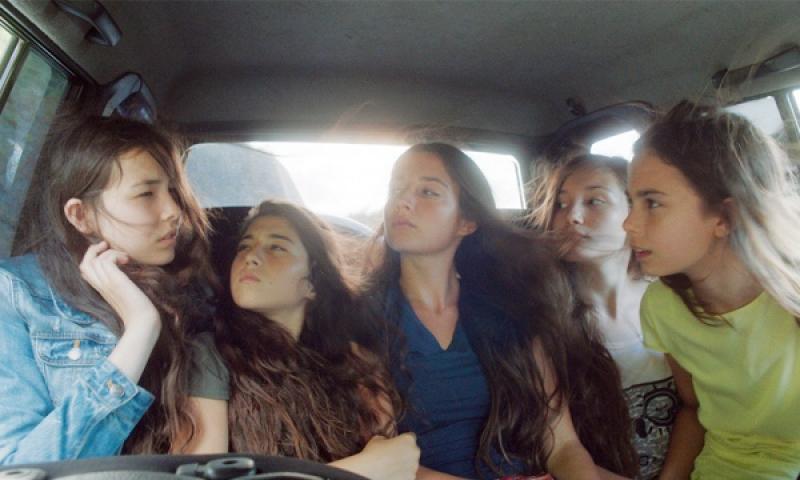Mustang | reviews, news & interviews
Mustang
Mustang
Riveting drama about five Turkish sisters under house arrest

Teenage girls in the West who routinely abuse their parents for imposing midnight curfews, cancelling suspicious sleepovers, and insisting bra straps be concealed should hope that they are not suddenly dragged along to see Mustang.
The discerning among them would likely be bowled over by the outstanding feature debut of the Ankara-born, French-educated filmmaker Deniz Gamze Ergüven. On the other hand, our daughters would be irked by having no grounds to complain about anything again after realising how fortunate they are not to be subjected to the restrictions imposed on high-school girls raised in ultra-conservative rural Turkey.
The role played by fundamentalism in their lives is vague; the tone is more secular than religious
Co-written by Ergüven and Augustine director Alice Winocour and a prizewinner at Cannes last year, Mustang is like a Turkish The Virgin Suicides with only a fifth of the carnage. It tells the story of five adolescent sisters – Sonay, Selma, Ece, Nur, and Lale – who were orphaned 10 years previously. After Lale (Güneş Sensoy), the barely pubescent protagonist and retrospective rueful narrator, sorrowfully parts from the Istanbul-bound teacher who’s her de facto mother, the girls scandalise the narrow-minded locals by romping innocently with some boys in the Black Sea surf. Why not? School's out for summer.
As a result, their grandmother (Nihal G. Koldas) and her ill-tempered surviving son Erol (Ayberk Pekcan) virtually imprison them at home, which they fortify to stop them escaping, though that doesn’t stop Sonay (Ilayda Akdogan), the assertive eldest, sneaking out to have sex (at no cost to her virginity) with the boy she loves. When the girls are allowed out in their grandmother’s company, they are forced to wear “shapeless, shit-coloured dresses". A succession of aunts is imported to teach them to cook as the house becomes, in Lale's words, a "wife factory".
These aunts, doubtless disempowered emotionally and physically when they themselves were young, are more sympathetic than the grandmother, a careworn woman grieving for Erol’s dead brothers and desperate to marry off the female charges she inherited reluctantly. One aunt makes Lale smile when she shows her how to make chewing gum. When football-mad Lale leads her sisters on a POW-camp-style breakout, so they can go and watch Trabzonspor play Galatasaray in a match from which male supporters have been banned, the TV cameras pick up the ecstatic girls in the crowd causing the grandmother, alerted at home, to faint. But another aunt heroically sabotages the house’s electric circuit and then the village’s so Erol and his mates never spot the AWOL sibs.
 This is lovely comedy, but the mood turns harrowing when it becomes clear most of the sisters will be forced to become the servile wives of older men, equally powerless and unenthusiastic, whom they neither know nor love. The exception is Sonay, who insists on marrying her boyfriend. On the day she does, Selma (Tugba Sunguroglu) is hitched to an unsmiling twentysomething with zero personality or interest in her. As the delighted Sonay dances (Ilayda Akdogan pictured above), Selma cynically drains as many discarded liquor glasses she can find, an indication of what her future holds. Sexual abuse meted out to Ece (Elit Iscan) and then to Nur (Doga Zeynep Doguslu) prompts Lale to take action on the eve of Nur's wedding, bringing about a siege that briefly turns the house into a haven, and then a chase in darkness that was confusingly staged.
This is lovely comedy, but the mood turns harrowing when it becomes clear most of the sisters will be forced to become the servile wives of older men, equally powerless and unenthusiastic, whom they neither know nor love. The exception is Sonay, who insists on marrying her boyfriend. On the day she does, Selma (Tugba Sunguroglu) is hitched to an unsmiling twentysomething with zero personality or interest in her. As the delighted Sonay dances (Ilayda Akdogan pictured above), Selma cynically drains as many discarded liquor glasses she can find, an indication of what her future holds. Sexual abuse meted out to Ece (Elit Iscan) and then to Nur (Doga Zeynep Doguslu) prompts Lale to take action on the eve of Nur's wedding, bringing about a siege that briefly turns the house into a haven, and then a chase in darkness that was confusingly staged.
Mustang is an immersive experience but not quite a powerful movie. Beyond the fact that the girls are oppressed, the role played by fundamentalism in their lives is vague; the tone is more secular than religious because Turkey is a secular country. Shorn of such context, the film seems insular and unworldly. It neeed a subplot, possibly, to shed philosophical or sociopolitical light on the girls’ predicament.
A potent storyteller, nonetheless, Ergüven dexterously harnesses the hand-held camerawork and the throbbing low-mixed score to steer the film into sinisterness. She is blessed by her five young actresses, especially Sensoy – whose refusal as Lale to be tamed gives the film its name – and Sunguroglu as Selma. She suffers the indignity of being probed by a doctor who is called in her suspicious husband and in-laws after she fails to bleed on her wedding night. “I slept with the entire world,” she beautifully deadpans.
One of Mustang’s grace notes is a mostly silent montage that enfolds the fretting grandmother, Lale escaping to the roof of the house to survey the countryside she’s forbidden from exploring, and Nur being prepped for marriage. It captures the sense of drift and hopelessness that characterises the gradually emptying home from which Lale knows she will soon be ejected into some unfeeling stranger’s bed and kitchen. There awaits for her, though, the gleaming Bosphorus, a symbol of hope not as distant as it seems.
Overleaf: watch the trailer to Mustang
The future of Arts Journalism
You can stop theartsdesk.com closing!
We urgently need financing to survive. Our fundraising drive has thus far raised £49,000 but we need to reach £100,000 or we will be forced to close. Please contribute here: https://gofund.me/c3f6033d
And if you can forward this information to anyone who might assist, we’d be grateful.

Subscribe to theartsdesk.com
Thank you for continuing to read our work on theartsdesk.com. For unlimited access to every article in its entirety, including our archive of more than 15,000 pieces, we're asking for £5 per month or £40 per year. We feel it's a very good deal, and hope you do too.
To take a subscription now simply click here.
And if you're looking for that extra gift for a friend or family member, why not treat them to a theartsdesk.com gift subscription?
more Film
 Don't Let's Go to the Dogs Tonight review - vivid adaptation of a memoir about a Rhodesian childhood
Embeth Davidtz delivers an impressive directing debut and an exceptional child star
Don't Let's Go to the Dogs Tonight review - vivid adaptation of a memoir about a Rhodesian childhood
Embeth Davidtz delivers an impressive directing debut and an exceptional child star
 One Battle After Another review - Paul Thomas Anderson satirises America's culture wars
Leonardo DiCaprio, Teyana Taylor, and Sean Penn star in a rollercoasting political thriller
One Battle After Another review - Paul Thomas Anderson satirises America's culture wars
Leonardo DiCaprio, Teyana Taylor, and Sean Penn star in a rollercoasting political thriller
 Steve review - educator in crisis
Cillian Murphy excels as a troubled headmaster working with delinquent boys
Steve review - educator in crisis
Cillian Murphy excels as a troubled headmaster working with delinquent boys
 Can I get a Witness? review - time to die before you get old
Ann Marie Fleming directs Sandra Oh in dystopian fantasy that fails to ignite
Can I get a Witness? review - time to die before you get old
Ann Marie Fleming directs Sandra Oh in dystopian fantasy that fails to ignite
 Happyend review - the kids are never alright
In this futuristic blackboard jungle everything is a bit too manicured
Happyend review - the kids are never alright
In this futuristic blackboard jungle everything is a bit too manicured
 Robert Redford (1936-2025)
The star was more admired within the screen trade than by the critics
Robert Redford (1936-2025)
The star was more admired within the screen trade than by the critics
 Blu-ray: The Sons of Great Bear
DEFA's first 'Red Western': a revisionist take on colonial expansion
Blu-ray: The Sons of Great Bear
DEFA's first 'Red Western': a revisionist take on colonial expansion
 Spinal Tap II: The End Continues review - comedy rock band fails to revive past glories
Belated satirical sequel runs out of gas
Spinal Tap II: The End Continues review - comedy rock band fails to revive past glories
Belated satirical sequel runs out of gas
 Downton Abbey: The Grand Finale review - an attemptedly elegiac final chapter haunted by its past
Noel Coward is a welcome visitor to the insular world of the hit series
Downton Abbey: The Grand Finale review - an attemptedly elegiac final chapter haunted by its past
Noel Coward is a welcome visitor to the insular world of the hit series
 Islands review - sunshine noir serves an ace
Sam Riley is the holiday resort tennis pro in over his head
Islands review - sunshine noir serves an ace
Sam Riley is the holiday resort tennis pro in over his head

Add comment